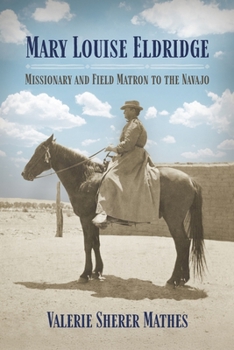Mary Louise Eldridge: Missionary and Field Matron to the Navajos
In the fall of 1891 Mary Louise Eldridge and Mary Raymond were sent by the Women's Home Missionary Society of the Methodist Episcopal Church to work among the Navajos living along the San Juan River in northern New Mexico. There they founded the Navajo Methodist Mission, which later moved near Farmington. After Raymond's unexpected death, Eldridge was appointed to replace her as a government field matron, and with the support of the Cambridge Indian Association, an auxiliary of the Women's National Indian Association, Eldridge supervised Navajo men in digging the Cambridge Ditch and their wives in weaving blankets in industrial rooms supported by the WNIA's Indian Industries League. Before Eldridge retired in 1915, she supervised the founding of six WNIA missionary stations on the reservation. One scholar described her as nurse, farmer, civil engineer for irrigation projects, trader, hospital administrator, fund raiser, policy advocate, cottage industry entrepreneur, and adoptive mother--duties far exceeding the government's vision of a field matron.
This biography with selected letters is the first history of Eldridge's WNIA-funded missionary work. It opens a critical window into social reform efforts among Native peoples in the American Southwest, the predicament of the Navajo Nation after their return from incarceration at Bosque Redondo, and the coercive assimilationist policies enacted against resistant Native peoples in the Dawes Act era.





